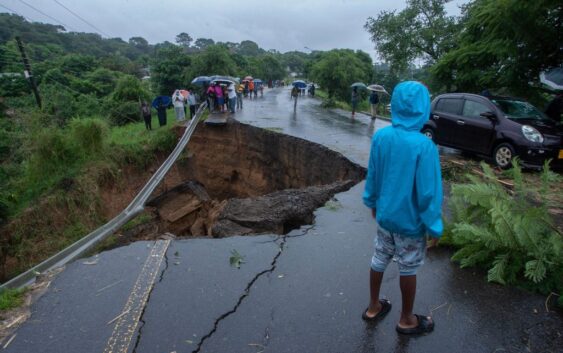- HOW TEMANE-MAPUTO ELECTRICITY TRANSMISSION LINE PROJECT IS GOING THROUGH TEST IN MOZAMBIQUE
- NEWLY OPENED PLASTIC RECYCLING PLANT SET TO HELP COMBAT NAMIBIA's PLASTIC INDUSTRY
- PROGRESS MADE ON PIIM PROJECTS AS OVER 85% COMPLETED IN ANGOLA
- WORLD BANK KICK-OFF INSPECTION OF USMID PROGRAM IN UGANDA
- ALGERIA MINISTER RECIEVED HARBOR ENERGY CEO OVER ENERGY PARTNERSHIP
IMF WARNED NEGATIVE IMPACT OF CLIMATE CHANGE TO AFFECT MALAWI GDP

The International Monetary Fund (IMF) has warned that the negative impact of climate change could affect Malawi’s growth prospects, and gross domestic product (GDP) per capita and worsen the country’s development challenges.
In a paper published on the IMF website www.imf.org titled ‘Climate challenges in fragile and conflict-affected areas, the global lender says that persistent changes in climate change have long-term negative effects on the country’s economic growth, as such, there is a need for authorities to introduce measures to mitigate the impact.
Reads the paper apart: “In the near-term, cumulative gross domestic product losses are estimated at four percent in fragile States like Malawi after three years of a disruptive extreme weather event compared to about one percent in other states.
“We find that per capita real output growth is adversely affected by persistent changes in the temperature such as drought conditions in fragile States would cut GDP per capita growth every year by 0.2 percentage points.”
The IMF further says that a persistent increase in average global temperature by 0.04 degrees Celsius per year, in the absence of mitigation policies, reduces real GDP growth per capita.
Malawi’s GDP per capita, a measure of a country’s standard of living, is currently at $714.3 (about K782 158.5), according to the Reserve Bank of Malawi (RBM) data, as such, a decline in the same means poverty levels in Malawi would worsen.
At the current $714.3, the per capita GDP is below that of neighboring Zambia at $1 137.3 (about K1.24 million), Tanzania at $1 099.3 (about K1.20 million), and Zimbabwe at $1 773.9 (about K1.94 million).
Meanwhile, Malawi 2063 (MW2063), the country’s long-term development plan, envisages that the country will be a lower middle-income economy by 2030 and that by 2063, the country will have attained an upper middle-income status.
The plan proposes growth rates of not less than six percent annually to turn the country into a middle-income economy by 2030.
Reacting to the report yesterday, National Planning Commission communications director Thom Khanje said the IMF findings speak strongly on the need to urgently address the current challenges.
He said: “We simply have to strengthen our economy and make it more resilient to shocks, natural or human-made while implementing robust climate change adaptation strategies.
“As long as our economy remains weak, any shock will have a devastating effect on our economy and livelihoods.”
Khanje, whose organization is championing the implementation of MW2063, said efforts by the country to manage climate change effects need to be supported by long-term solutions to strengthen the economy.
In mid-March this year, Cyclone Freddy hit the Southern Region, which compelled the RBM to revise downwards the growth projection from 2.7 percent to 1.9 percent.
SOURCE: The Nation

